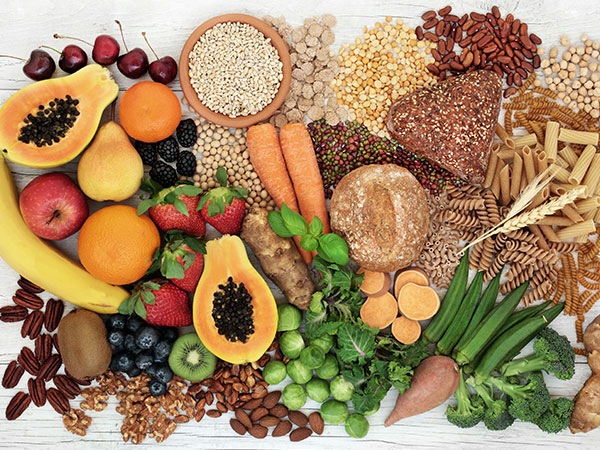Foods that help fight constipation are those rich in fiber, such
as whole grains, nuts, and raw vegetables. In addition to fibers, water is
also important in treating constipation because it hydrates the bowel movement
and makes it easier for stool to pass through the intestine.

Constipation is normally caused by excessive consumption of
sugars, fats and industrialized foods, but it can also be a consequence of the
lack of physical activity and the prolonged use of medications such as
laxatives and antidepressants.
Foods that fight constipation
The main foods that
help fight constipation are:
·
Vegetables , especially
raw and leafy vegetables such as cabbage, cabbage, or lettuce;
·
Shell and bagasse fruits , because
they are rich in fibers;
·
Whole grains like
wheat, oats, rice, buckwheat, quinoa;
·
Black , white,
brown beans, lentils, and chickpeas;
·
Flours high in fibers such as flaxseed,
carob, coconut, almonds;
·
Germ and wheat bran , oats;
·
Dried fruits such as raisins
and raisins;
·
Seeds such as flaxseed,
chia, squash, sunflower, and sesame;
·
Probiotics , such as
yogurts, kefir, kombucha, and sauerkraut, for example, because they help
regulate intestinal flora.
Raw and whole foods
contain more fiber than cooked and refined foods, and therefore improve
intestinal transit. Also, foods rich in water such as pineapple, cucumber
and watermelon should be consumed.
Foods to avoid
Foods that cause or
worsen constipation and should be avoided are:
·
Foods rich in sugars such as soft drinks, cakes, sweets, filled
biscuits, chocolates;
·
Culinary preparations rich in fats, such as fried or breaded;
·
Complete milk and its derivatives, as they are rich in fats;
·
Fast food or frozen food, lasagna or pizza type;
·
Processed meats like sausages, bacon, sausages, and ham.
Some fruits like
banana or plantain when green, as well as guava, can make constipation
worse. In addition to this, lack of physical activity and frequent use of
laxatives, antidepressants, or heart-fighting medications can also cause this
problem.
How much water and
fiber should be consumed
Fibers are substances of plant origin
that are not digested by enzymes of the gastrointestinal tract, causing the
amount of liquid in the stool of the colon, the intestinal microbiota, the
weight and frequency of the stool, and the rate of the colon. The
recommended amount of fiber for adults should be between 25 to 38 grams per day
in adults and 19 to 25 g in children.
Water and liquids are responsible for
hydrating the fibers from the diet at the level of the intestine, softening the
stool and facilitating its elimination. In addition, it also hydrates the
entire intestinal tube, making the stool to pass more easily until it is
expelled.
In general, at least 2L of water per
day is indicated, however, the ideal amount of water varies according to the
person's weight, being 35 ml / kg per day. So a person with 70 kg should
consume 35 ml / kg x 70 kg = 2450 mL of water per day.
Sample menu for
constipation
The table below shows a sample 3-day
menu to combat constipation:
|
Foods
|
Day 1
|
Day 2
|
Day 3
|
|
Breakfast
|
1 cup plain fruit yogurt + 1 teaspoon oatmeal + 1 teaspoon chia + 2
prunes
|
1 glass of orange juice with 1 teaspoon of flaxseed + 2 scrambled eggs
with 2 whole toasts
|
1 glass of papaya with 1 teaspoon of chia +1 whole wheat tortilla with
white cheese
|
|
Morning snack
|
2 und of plum + 10 und of cashew / merey / cashew
|
2 slices of papaya
|
1 banana
|
|
Lunch dinner
|
90 g of Grilled salmon + asparagus with olive oil + 4 tablespoons of
brown rice + 1 tangerine
|
Wholemeal pasta with ground meat and natural tomato sauce + Green
salad with olive oil + 1/2 cup of strawberries
|
90 grams of Grilled Chicken + 4 tablespoons of quinoa + Broccoli salad
with carrots + 1 orange
|
|
Afternoon snack
|
1 glass of papaya orange juice with 1 teaspoon of chia + 2 whole toast
with 1 scrambled egg
|
1 plain yogurt with chopped fruit + a handful of grapes
|
1 slice of whole wheat bread with 1 slice of cheese
|
The amounts included in the menu vary
according to age, sex, physical activity and if you have any associated disease
or not, so the ideal is to go to a nutritionist for a complete evaluation and
develop a nutritional plan tailored to your needs.
By maintaining a balanced diet and
adequate water intake, it is normal for the intestine to start working well
after about 7 to 10 days of diet. In addition to this, it is important to
remember that frequent physical activity also helps regulate intestinal transit.











No comments:
Post a Comment